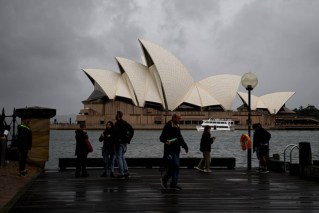The Belt and Road Initiative in Victoria, sister cities and international education partnerships could be torn up in a sweeping move by the federal government to “speak with one voice” on the global stage.
The federal government is citing “complex” national security concerns as it makes the case for its new Australia’s Foreign Relations (State and Territory Arrangements) Bill 2020.
Under the legislation, Foreign Minister Marise Payne would be allowed to stop state and territory governments, local government, universities and other organisations from making agreements she believes “go against Australia’s foreign policy”.
This could include Victoria’s controversial Belt and Road Initiative agreement with China, a so-called “soft power” exercise from Beijing which the federal Parliamentary Library calls “a foreign policy and economic strategy of the People’s Republic of China”.
Under the initiative, China has entered into partnerships with dozens of foreign jurisdictions to co-ordinate policies on development, infrastructure, trade, finance and cultural exchanges.
The Belt and Road plan has been criticised by some western governments as a form of “neo-colonialism” from China, claiming the plan encourages jurisdictions into accepting debt from Beijing.

Victoria’s Belt and Road Initiative could be one of those in the firing line. Photo: AAP
A recent analysis from the Australian Institute of International Affairs – written by one-time Liberal Party candidate and current NBN Australia manager John Varano – said Victoria joined the initiative without consulting with Canberra “contradicting the position of the federal government to not join the BRI as it raised geostrategic concerns”.
Under the new act, to be introduced into Parliament next week with plans to be legislated by year’s end, the foreign minister will be able to cancel agreements between Australian state and foreign governments as well as university partnerships and sister city agreements.
The slapdown of state and territory governments comes after they were given briefings to outline the concerns of Australian security agencies about these types of agreements.
“The Commonwealth government has exclusive responsibility for conducting Australia’s foreign affairs,” Prime Minister Scott Morrison said in a statement.

Foreign Minister Marise Payne would have the power to cancel such agreements. Photo: AAP
“However, state and territory governments and their entities currently also enter into arrangements with foreign governments in a range of areas – from trade and economic co-operation to cultural collaboration and university research partnerships – without having to inform the Commonwealth.”
Under the test, the foreign minister would have to be satisfied the arrangement would “adversely affect Australia’s foreign relations” or it was “inconsistent with Australian foreign policy”.
The minister would then be able to rip up agreements already made or to order a halt to negotiations, and escalate legal action to the High Court if the order is not heeded.
“It is vital that when it comes to Australia’s dealings with the rest of the world we speak with one voice and work to one plan,” Mr Morrison said.
“Australians rightly expect the federal government they elect to set foreign policy.
“These changes and new laws will ensure that every arrangement done by any Australian government at any level now lines up with how we are working to protect and promote Australia’s national interest.”
Under the legislation, governments and institutions would have to disclose such agreements on a public register.
The federal government has been concerned that some agreements are not announced widely.
“While many agreements and partnerships are of a routine nature, it is important that the federal government is notified of all and any agreements,” Mr Morrison said.

China’s ‘one belt, one road’ policy is building a ‘new silk road’ across Asia. Photo: AAP
“Where any of these agreements undermine how the federal government is protecting and promoting our national interests, they can cancelled.”
The plan does not apply to commercial corporations or state-owned enterprises.
Ms Payne claimed there was currently “no legislative requirement, nor clear understanding, that states and territories consult properly with the Commonwealth on arrangements with foreign governments”.
The legislation is expected to be introduced into federal Parliament next week.
Minister Wang Xining, Deputy Head of Mission/Minister, Embassy of the People’s Republic of China in Australia, Addressing the #NPC on “China and Australia – Where to from here?”
Live now on @abcnews and @SkyNewsAust 📺 pic.twitter.com/GpAIpJS9FG— National Press Club (@PressClubAust) August 26, 2020
“The BRI is one of the biggest public goods that China provided to the world, and it’s become the biggest platform for international co-operation,” he said.
In response to a question about Beijing’s soft power programs like the BRI and ‘Confucius classroom’ partnerships between Australian and Chinese schools, Mr Wang slammed critics.
“I think people are smart enough to decide what influence is good and worth considering, and what is bad and must be fended off,” he said.
“I don’t see any reason for whining about your constitutional fragility and your intellectual vulnerability.”









